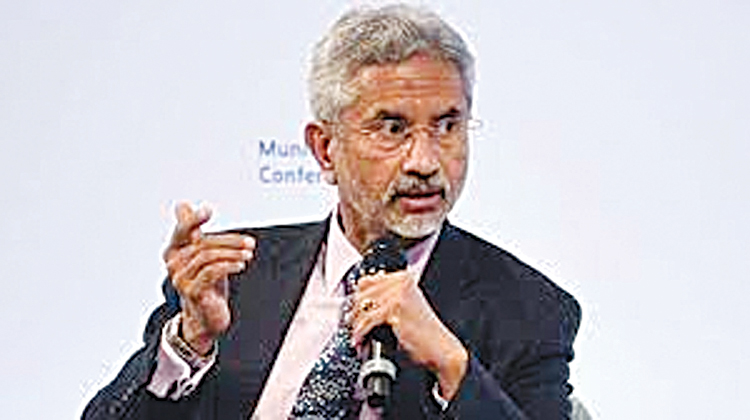New Delhi, June 8 (FN Agency) External Affairs Minister S Jaishankar said today that India will never accept any attempt to unilaterally change the status quo on the border and a posture that departs from established understandings “will evoke its own responses” – in a reference to the border row with China. Addressing the foreign diplomatic corps based in India during an event hosted by the Ministry of External Affairs to mark eight years of the Narendra Modi government, the EAM also said that India is looking forward to joining the Nuclear Suppliers Group (NSG). On the Neighbourhood First policy, he said that “We envisage India as a larger lifting tide for the entire region.”“Our borders also need safeguarding and we will never accept any attempt to unilaterally change the status quo. A posture that departs from established understandings will evoke its own responses. When it comes to security, we will do what it takes to ensure national well-being. I acknowledge also the role of trusted partners who work with us to help keep India safe and secure every day. We have overcome the hesitations of history and will not allow anyone a veto on our choices,” the EAM said. “Strengthening a rules-based order is a natural inclination of a polity like India. We value all opportunities to contribute to it. Our membership of the MTCR, Australia Group and the Wassenaar Arrangement are therefore significant. As a nation with a substantial nuclear industry, we also look forward to joining the Nuclear Suppliers Group, overcoming the political impediments that are against global interest,” he added. “If you consider Neighbourhood First, for example, it is now clearly associated with a generous and non-reciprocal approach to our immediate proximity. We envisage India as a larger lifting tide for the entire region. Our investments in connectivity, expansion of contacts and promotion of cooperation have also been noteworthy. Whether it was during Covid or the current economic challenges, India has gone the extra mile for its neighbours and will continue to do so,” the EAM said.
On the extended neighbourhood, he referred to the Act East policy, the Sagar doctrine, Gulf engagement and a Central Asia initiative. “In each case, whether it is leadership attention, diplomatic energies, practical projects or shared activity, the record is one of higher commitment.” Referring to Africa, Latin America and Caribbean and the Pacific Islands, he said “there has been a spike in our engagement and activities. The Covid years did disrupt some of the momentum and we expect to pick up on that very soon.” On the UN, he said India is currently serving as a non-permanent member of the Security Council and is very active in UN organizations and in peacekeeping. “While our endeavours will always remain supportive, we also share the disappointment of the international community about the UN’s declining effectiveness. Our advocacy of reformed multilateralism therefore has become even stronger,” he added. “An India that is more capable is also an India more sensitive to global expectations. The last eight years have seen us undertake the responsibility of First Responder in many situations,” he said, and referred to the earthquake in Nepal, the conflict in Yemen, the water crisis in the Maldives, the mudslides in Sri Lanka, the typhoon in Myanmar and floods in Mozambique. “But while doing so, we seek to strengthen the capacities of our partners as well. In that very spirit, we are responding to the food, health and other requirements of the Afghan people now. Our historical ties warrant that we take the long view.” He said India is taking initiatives on global concerns that are truly consequential, and referred to the International Solar Alliance that India has co-led and now has 106 members, and the Coalition for Disaster Resilient Infrastructure which is making steady progress.
He said India is active in shaping the global discourse on many other issues, including connectivity and maritime security, resilient and reliable supply chains, data and cyber security as well as terrorism, violent extremism and black money. “The proof of the pudding is however in the eating and that was certainly so when it came to our Covid response. We supplied Made in India vaccines to 98 countries and continue doing so even today. Our medicines and medical personnel also made contributions abroad in these very crucial times. We count Vaccine Maitri as one of our key achievements of this period, not just for reasons of health but as a statement of solidarity,” he added. Referring to the Ukraine conflict, he said that just as the world was hoping to recover from the Covid pandemic effects, it is now confronted with the repercussions of the Ukraine conflict. “Our position on the matter itself has been stated at length at various forums. But beyond the conflict, the world today faces severe challenges in the rising costs of energy, food and fertilizers. The Global South is particularly impacted. The need for an early end to the fighting and a return to diplomacy truly gets stronger with each passing day.” “The India that you live in and report on is obviously different from the one before. It has development as its focal point, whether at home or in foreign policy. It is a daily proof that democracies can deliver. Its human development indices improve constantly, even as it rises to meet unprecedented challenges. “This is a polity with an enhanced popular participation in its decision making and greater authenticity in its expressiveness. It is one that harmonises its national interests with its international obligations. Appropriately, as India celebrates 75 years of independence, it seeks to do so with the world,” he added.

